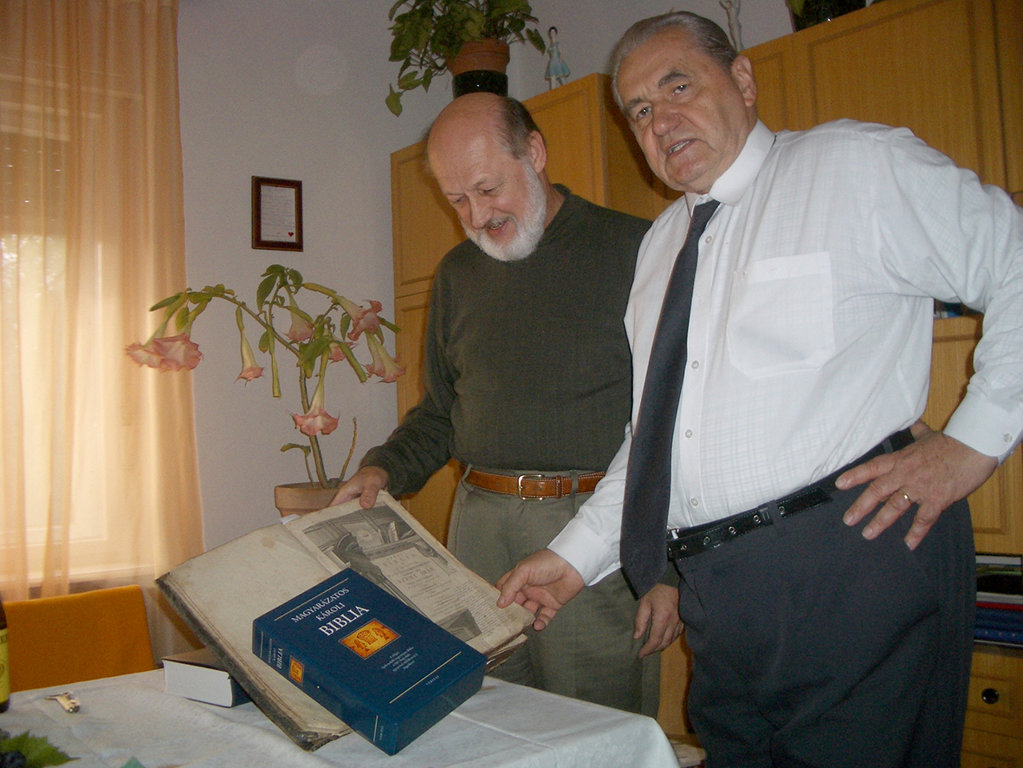The revision of the Karoli Bible
Article in the American-Hungarian Reformed Periodical
Hungary, the 16th century, era of the Turkish invasion. This was the time when Gaspar Karoli appeared on the scene; only a few decades after the Mohacs Disaster, the tragedy of the nation. Hungary ceased to be the country it once was. Confusion, helplessness and hopelessness conquered the people, from great to small, poor to rich. Gaspar Karoli’s answer to the most pressing need of his time: the birth of the Bible of Vizsoly in 1590, published after three years of strenuous work. So begins the sweeping conquest of souls through the Holy Scripture in the Hungarian language.
The Karoli Bible’s role in Hungarian history is singular. No other book ever exerted a greater influence on the Hungarian language. Even today, 30 years after the publishing of the New Protestant Bible, the Karoli has maintained its status among those who shape Hungarian literature. To our writers and poets, if the Bible, then it must be the Karoli, if quoting the Bible, then it must be quoted from the Karoli.
Why do we need a newly revised Karoli?
Every generation is faced with the challenge of finding the best way to harmonize the present and still preserve the values and traditions of the past, particularly in light of the pressure politics can exercise upon cultural expression. In our age of globalism, this process is even more critical. The responsibility of our generation is to rescue most precious treasures of the Hungarian past: this includes the preservation of the Karoli Bible for future generations. I believe that with a newly revised Karoli, we can still uphold the influence of the Karoli Bible upon the nation, but twenty years from now it would be too late. Today, it is still read by multitudes; twenty years from now it will only be read by an insignificant minority. If the language of the “old Karoli” were more up-to-date, then its readability and influence on the nation would remain the same. We are revising the Bible not for the sake of Karoli’s name, but for the sake of keeping alive the influence it has had on the nation for generations. Nowadays, one of the most important responsibilities of those who are forced into minority is to preserve and proclaim traditional values. And along this line, it is exceptionally important to pass on the inherited revelation of God, the Holy Scripture, in a clear and generally understandable, but still in authentic form. The original message must come through in its original strength and power to address the people of every generation, including our own. The Bible of Vizsoly, and multiple revisions of the Karoli text in the centuries to follow, was able fulfill this task, but the most recent 1908-revised text is more than ripe to a new revision. In this process, however, I believe it is important to maintain the “Karoli character,” to the detriment of modernization. Thus, the Karoli Bible, considered a national treasure, can stay in character with its cultural heritage and avoid competition with the New Protestant Bible, which is defined by its modern language.
Commissioned by the Protestant Media Foundation, which was established in 1996, the revision work of the Karoli Bible is underway, with the participation of Reformed, Lutheran and Baptist theologians, linguists and literary scholars. The New Testament is ready for print; the printing of the complete Bible will follow in a year. We believe that even today the Bible has the answer to the most pressing need of our age.

Joseph Baranyi and Prof. Ferenc Szilagyi with the Karoli Bible
“This (HMI) is a very unique ministry. Joseph Baranyi was able to raise the interest of many American churches and individuals toward the spiritual needs of the Hungarian people like no one else has done in the history of our nation. This is a tremendous accomplishment that we take as a special blessing from God. The 19th century Scottish Mission in Hungary comes to my mind when I see HMI’s activities among Hungarian speaking people [In explanation, the Scottish Mission spurred on a wave of revivals and spiritual growth, being particularly significant in that foreign missionaries had such an impact on the Hungarian nation]. The Scottish Mission created at that time tremendous blessings, revivals with long standing effects. Another more recent example to which I can compare Joseph’s work is when in 1990 the Communist regimes fell in Eastern Europe, including Transylvania, and the German and Holland Christians poured their gifts and donations to the needy churches in Transylvania. HMI is channeling immeasurable spiritual blessings from the American Christians to the Hungarian people... HMI’s activity is very much needed in Hungary, because no one else is doing what you are doing there. There are many deficiencies in our native land and you found those gaps, probably the most important ones, to fill it up... As far as the future is concerned, I would say, just continue your work the same way as you did before.”
Bishop Andor Demeter
